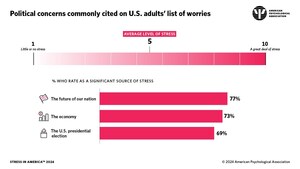Stress About Health Insurance Costs Reported by Majority of Americans, APA Stress in America™ Survey Reveals
Uncertainty About the Future of Their Own Health and That of Others Also Significant Source of Stress
WASHINGTON, Jan. 24, 2018 /PRNewswire-USNewswire/ -- Two-thirds of U.S. adults (66 percent) cite the cost of health insurance as a stressor for themselves, their loved ones, or in general, when asked about specific health issues that cause them stress. This stress about the cost of health insurance seems to affect Americans at all income levels.
In addition, more than six in 10 adults (63 percent) cite uncertainty about the future, both with their own health and that of others, as a source of stress. Insurance costs and looming uncertainty about the future are just two of the numerous causes of stress surrounding health, according to the American Psychological Association's report, Stress in AmericaTM: Uncertainty About Health Care based on data from the annual Stress in AmericaTM survey, conducted online by The Harris Poll.
Released today, the report takes a deeper look at how health and health care is affecting the stress levels of Americans. Sixty percent of American adults say personal health concerns or health problems affecting their family are a very or somewhat significant source of stress. Sixty-four percent of those with less than $50,000 in annual household income cite health insurance costs as a source of stress for themselves, their loved ones, or in general, while 69 percent of those with annual household incomes of $50,000 or more report stress from the cost of health insurance.
The survey also found that uninsured adults report significantly higher average stress levels of 5.6 (on a 10-point scale, where 1 is "little or no stress" and 10 is "a great deal of stress") when compared with adults who have health insurance (4.7).
"Given the uncertain fate of our nation's health care system, it is not surprising that the majority of those adults surveyed expressed concerns about access to health care and costs," said Arthur C. Evans Jr., PhD, APA's chief executive officer.
"If stress becomes chronic, it can lead to significant health consequences. It's important to remember that there are steps that people can take to manage their stress in healthy and productive ways, like exercising, spending time with friends and family and finding ways to get involved in your community, including making your concerns known to policymakers."
The survey also found a divide in the average stress levels among Americans living in urban (5.2), suburban (4.5) and rural (4.7) areas. While adults living in the different areas report similar sources of stress when it comes to health care, the percentage of stress varies. More Americans in urban areas are stressed about the cost of health insurance insurance for themselves, their loved ones, or others in general (74 percent) than those in suburban (62 percent) and rural (64 percent) areas. Uncertainty about the future regarding their health and that of others is another area of divide among urban (71 percent), suburban (61 percent) and rural (55 percent) adults. Both suburban and rural Americans are equally stressed about changes to health care policy from Washington (56 percent) while once again, urban Americans a more likely to experience stress (66 percent) about it.
When it comes to stress regarding specific health care issues, age is another factor where differences appear. A lack of access to mental health care is more likely to be a source of stress for Millennials (56 percent) and Gen Xers (47 percent) than for boomers (27 percent) and older adults (20 percent). Reproductive health care access is another area where this divide is most evident, with the issue stressing Millennials (55 percent) and Gen Xers (43 percent) than boomers (25 percent) and older adults (14 percent).
In addition to age, race and ethnicity also play a role in concerns about health care. Nearly two-thirds of Hispanic adults (64 percent) say they experience stress when thinking about themselves, their loved ones or people in general losing access to health care services. In comparison, this was less likely to be a concern to members of other racial and ethnic groups, though still reported by about half of respondents (i.e., 56 percent of Asian-Americans, 51 percent of black Americans, 50 percent of Native Americans and 49 percent of white Americans).
To read the full Stress in America report or to download graphics, visit http://www.stressinamerica.org.
For additional information on stress, lifestyle and behaviors, visit www.apa.org/helpcenter. Join the conversation about stress on Twitter by following @APAHelpCenter and #stressAPA.
Methodology
The 2017 Stress in America™ survey was conducted online within the United States by The Harris Poll on behalf of the American Psychological Association between Aug. 2 and 31, 2017, among 3,440 adults age 18+ who reside in the U.S., including 1,376 men, 2047 women, 1,088 white, 810 Hispanic, 808 black, 506 Asian, and 206 Native American adults. Interviews were conducted in English (n=3,187) and Spanish (n=253). Data were weighted to reflect their proportions in the population. Weighting variables included age, gender, race/ethnicity, education, region and household income. Propensity score weighting was also used to adjust for respondents' propensity to be online. Hispanic respondents were weighted for acculturation, taking into account respondents' household language as well as ability to read and speak in English and Spanish. Because the sample is based on those who were invited and agreed to participate in the Harris Poll online research panel, no estimates of theoretical sampling error can be calculated. A full methodology is available at www.stressinamerica.org.
The American Psychological Association, in Washington, D.C., is the largest scientific and professional organization representing psychology in the United States. APA's membership includes nearly 115,700 researchers, educators, clinicians, consultants and students. Through its divisions in 54 subfields of psychology and affiliations with 60 state, territorial and Canadian provincial associations, APA works to advance the creation, communication and application of psychological knowledge to benefit society and improve people's lives.
SOURCE American Psychological Association
Related Links
WANT YOUR COMPANY'S NEWS FEATURED ON PRNEWSWIRE.COM?
Newsrooms &
Influencers
Digital Media
Outlets
Journalists
Opted In






Share this article